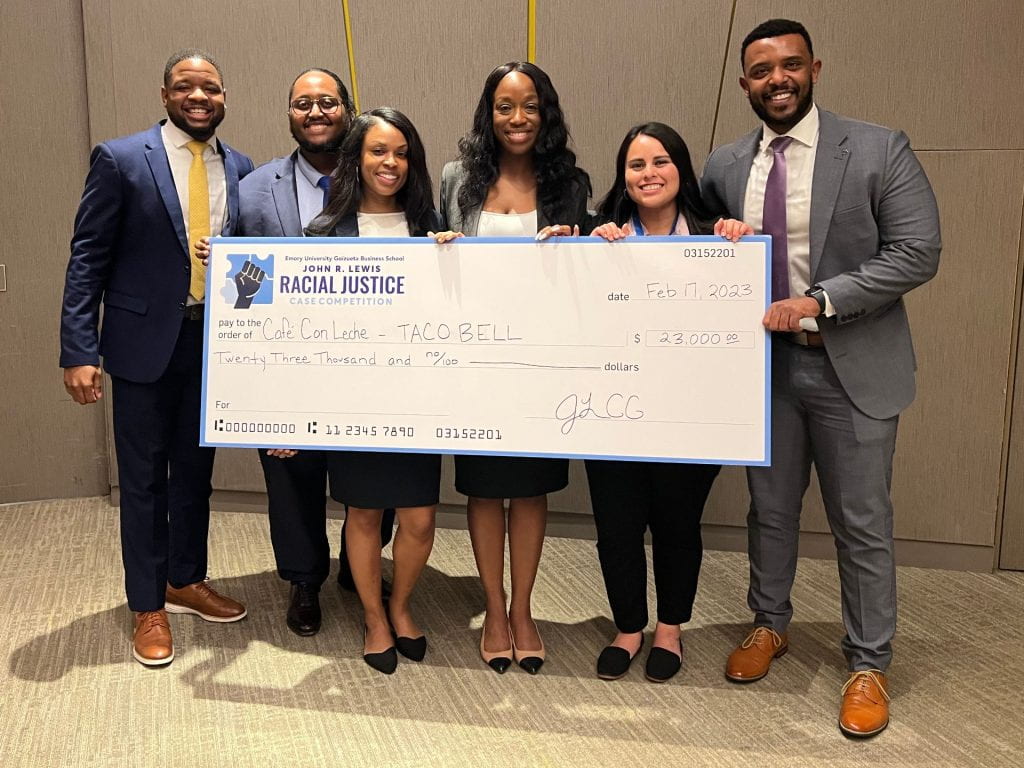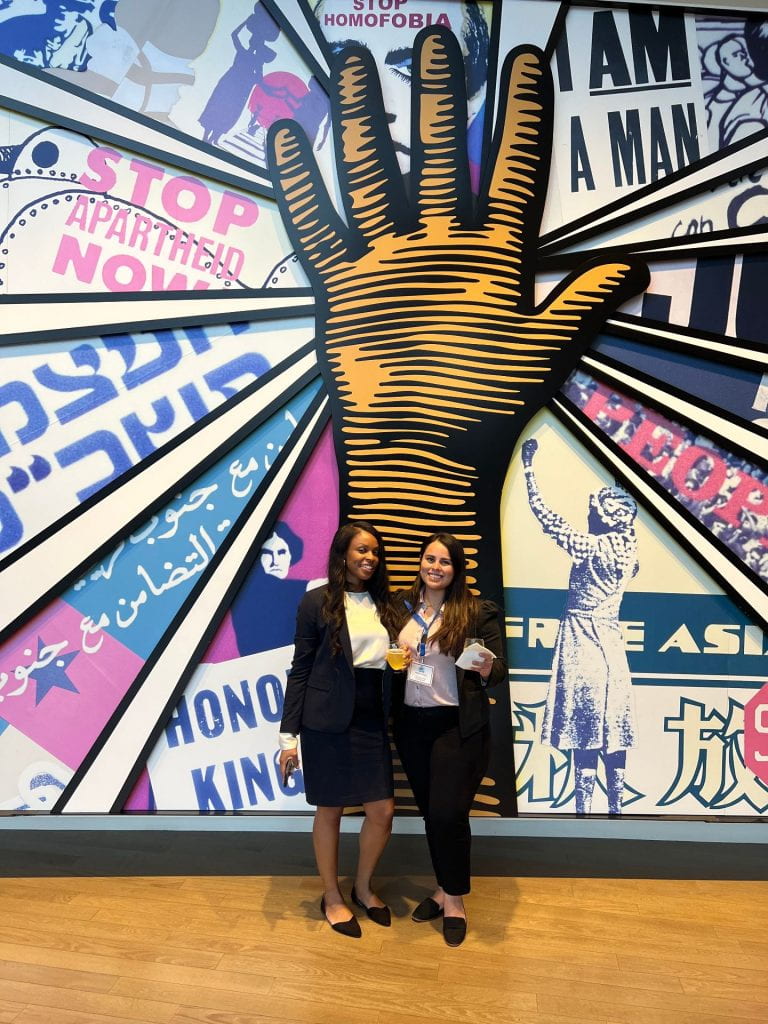
Members of the winning team, left to right, Samuel Clark, Armel Nibasumba, Vennetta McCray, Taydra Jones, Natalia Corredor and Paulos Tewalde.
ATLANTA – Six Full-Time MBA students at the Indiana University Kelley School of Business swept the competition in the third annual John R. Lewis Racial Justice Case Competition at the Goizueta Business School at Emory University.
Competing under the name “Café Con Leche,” the team of second-year MBAs Taydra Jones, Natalia Corredor, Vennetta McCray, Armel Nibasumba, Paulos Tewalde and Samuel Clark won both the overall competition and the audience choice award.
The Kelley School team earned the top prize this year for their “Ringing the Bell” strategy, a three-pronged plan designed to help Taco Bell, one of the competition’s sponsors, achieve a more diverse supplier base.
The team will split the $20,000 prize down the middle with chosen charity organization The Urban Canopy, an organization pioneering the local food cycle to create a more sustainable and equitable food system on Chicago’s Southside. All teams share half of their prize winnings with an organization of their choosing that advances racial justice.
The team also received the Audience Choice award, accompanied by an additional $3,000 prize.
“This competition exemplifies many of the values that are reflected in a Kelley School education — teamwork, diversity and equity, and societal impact,” said Ash Soni, interim dean of the Kelley School and the Sungkyunkwan Professor. “We’re thrilled the Kelley team won the competition and the audience choice award. We know our students are special, and it’s wonderful when others recognize their talent.”
Created in 2020 to honor the late John R. Lewis, a civil rights icon and U.S. representative from Georgia, the competition is the first of its kind, student-run case competition focused on racial justice.
It provides students with an opportunity to understand the history of systemic racism in the United States and provide bold, innovative, and actionable recommendations for companies actively looking to address issues of racial inequality both inside and outside their organizations.

Vennetta McCray, left, and Natalia Corredor toured the National Center for Civil and Human Rights in Atlanta.
“To be awarded a first-place award with his name on it is humbling,” said Corredor, a Consortium for Graduate Study in Management Fellow and a Forté Foundation Fellow. “John Lewis challenged inequitable systems since he was a teenager and has left behind a legacy that challenges us to cause get in good, necessary trouble.
“This case competition asks business leaders to thoughtfully craft a problem statement so that equally thoughtful solutions are produced. It’s important to me to champion racial justice in my future workplaces and continue to be involved in community programs that advance disadvantaged groups,” added Corredor, a native of Colombia from Chicago who came to the United States as a child.
Clark, who also is vice president of the Black MBA Association, said the win “meant the world” to him, especially after his team was eliminated during the semi-finals of last year’s competition.
“This competition provided us the opportunity to address concerns that are prevalent in communities we’re a part of and incorporate that perspective into our approach,” Clark said. “The combination of amplifying issues that marginalized communities are facing every day and doing so in front of an audience of companies who have the reach to make a significant impact is why we were so passionate about participating.”
For the first time, the finals were held in person, in connection with a conference focused on fostering community and creating bold solutions between future and current business leaders.
The case competition pairs sponsoring companies with students looking to make a change in the realm of racial justice and inequality. More than 30 student teams from 20 leading universities across the country entered the competition last fall.
Twelve teams advanced to the semifinals and were paired with either Taco Bell or Delta Air Lines to solve a sponsor-specific concern. On Jan. 20, the pool narrowed to four finalist teams, from the University of California-Berkeley, the Georgia Institute of Technology and the University of Rochester in addition to the one from Kelley.
The students worked on the case for 12 weeks, researching the issues through a survey and focus group and use of government data, consultancy reports and peer-reviewed journals. For the semi-finals, they took the problem statement provided by Taco Bell and examined it from every perspective, compiling insights from industry professionals, Taco Bell leaders, focus groups and survey data.

Samuel Clark
“This allowed us to develop an understanding of the current state of supplier diversity, informing us as to the major contributing factors of inequitable practices within various supplier diversity programs,” said Clark, who is from New York.
“Over half of our team is pursuing consulting, and we utilized their knowledge of frameworks to analyze Taco Bell’s current program and identify areas where our insights could have the most impact. Following that, we spent a significant amount of time refining the content of our strategy and ensuring that we were communicating an actionable yet impactful recommendation,” he added.
Finalists were invited to Goizueta Business School’s campus Feb. 16-18 for the inaugural in-person “Making the Case for Change” weekend, which included the “Good Trouble, Good Business” welcome reception at the Delta Flight Museum, a self-guided tour of the National Center for Civil and Human Rights and presentations by Georgia congresswoman Nikema Williams, environmental youth activist Charitie Ropati and Goizueta faculty.
“Once our deck was finalized, we knew that the best way to set our team apart was through storytelling, presence, and presentation skills,” McCray, who also is a Consortium and Forté Foundation fellow. “We spent a significant amount of time practicing our talking points and delivering it in a way that was memorable for the audience. The night before the completion we all met in a hotel room and went over our presentation after a long day of activities. Exhausted, we all powered through.
“It is a huge deal for us to offer solutions to a major company because of the potential widespread impact,” she added. “Just the thought of such a huge organization implementing an idea that our team came up with is humbling.
Corredor said they felt confident in their solution because of their preparation, but was “blown away” by how well it was received, especially since they challenged the company on their current practices.
“Before this case competition, I was unaware of the limitations Diverse Business Enterprises faced that span from securing a loan to meeting the requirements of large corporations once they’re an approved supplier,” she said. “I’m excited about the prospect of our solution supporting the growth of Diverse Business Enterprises. Because Taco Bell is a part of Yum! Brands, the implementation of our solution could have an even larger impact than the $400 million Taco Bell wants to redirect towards diverse suppliers.”
Winners were announced by Jerrick Lewis, the congressman’s nephew and executive director of the John R. Lewis Legacy Institute.
All the teams share half of their prize winnings with an organization of their choosing that advances racial justice. For McCray and Corredor, the selection of Urban Canopy has special meaning as they are both from Chicago.
In addition to those who watched in person, many Kelley students, faculty, staff, and alumni watched events unfold through Zoom from Bloomington and beyond. Loud cheers could be heard from Full-Time MBA Program offices after the outcomes were announced.